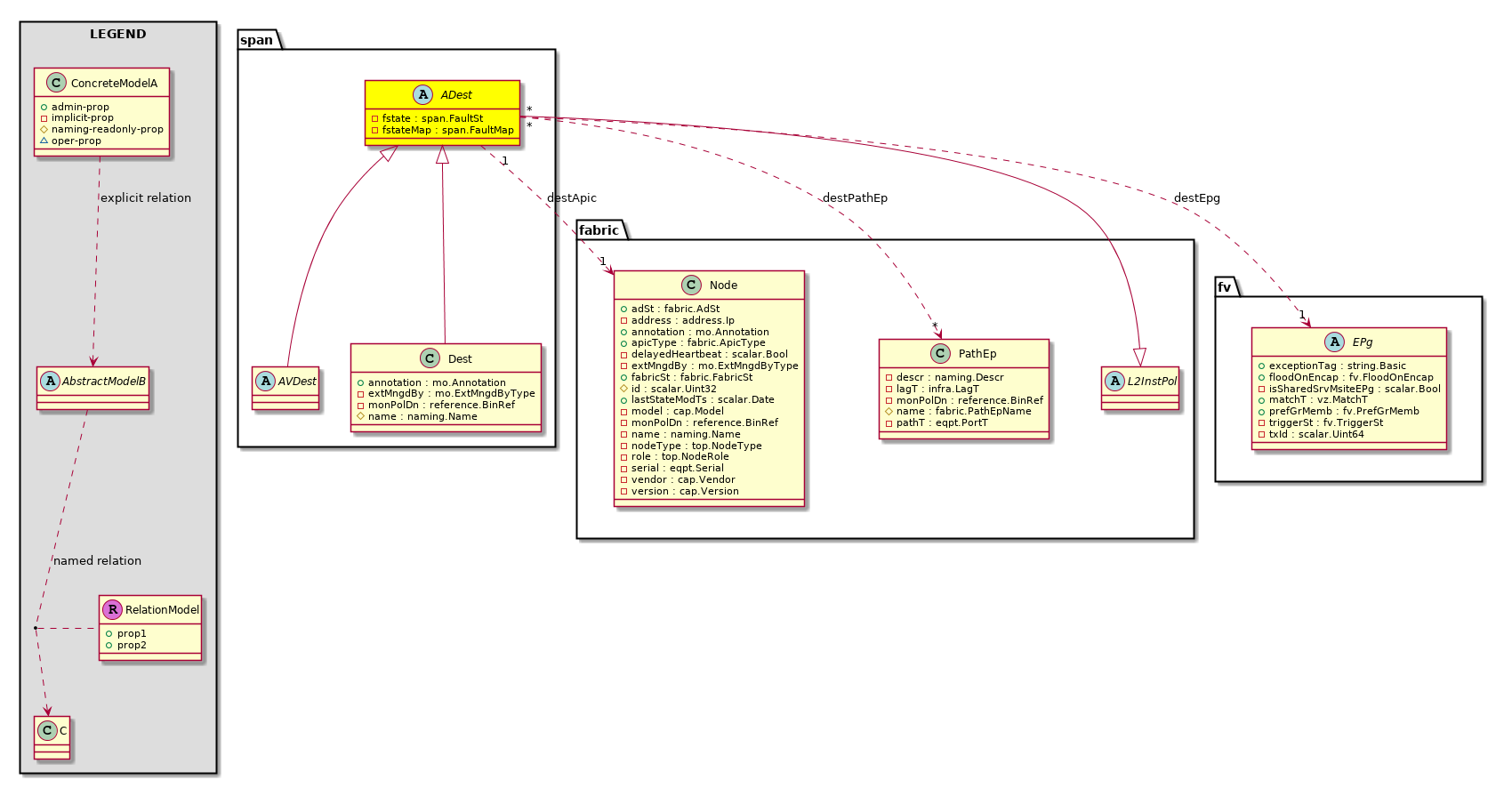| Properties Summary |
childAction
Type: mo:ModificationChildAction
Primitive Type: scalar:Bitmask32
Units: null
Encrypted: false
Access: implicit
Category: TopLevelChildAction
Comments:
-
Delete or ignore. For internal use only.
| |
| Constants |
| deleteAll |
16384u |
deleteAll |
NO COMMENTS
|
| ignore |
4096u |
ignore |
NO COMMENTS
|
| deleteNonPresent |
8192u |
deleteNonPresent |
NO COMMENTS
|
| DEFAULT |
0 |
--- |
This type is used to
|
|
descr
Type: naming:Descr
Primitive Type: string:Basic
Like: naming:Described:descr
Units: null
Encrypted: false
Access: admin
Category: TopLevelRegular
Property Validators:
Range: min: "0" max: "128"
Allowed Chars:
Regex: [a-zA-Z0-9\\!#$%()*,-./:;@ _{|}~?&+]+
Comments:
-
Specifies a description of the policy definition.
dn
Type: reference:BinRef
Units: null
Encrypted: false
Access: implicit
Category: TopLevelDn
Comments:
-
A tag or metadata is a non-hierarchical keyword or term assigned to the fabric module.
fstate
Type: span:FaultSt
Primitive Type: scalar:Enum16
Units: null
Encrypted: false
Access: implicit
Category: TopLevelRegular
Comments:
-
| |
| Constants |
| no-fault |
0 |
NoFault |
Unspecified
|
| non-shared-route-leak |
1 |
Non-shared Route Leak |
Routes
|
| invalid-dest-epg |
2 |
Invalid Destination Epg |
EPG
|
| invalid-dest-port |
3 |
Invalid Destination PathEp |
Fabric port invalid
|
| unavailable-dest-port |
4 |
Unavailable Destination PathEp |
Fabric por not avaialble
|
| unavailable-dest |
5 |
Destination unavailable |
Dest not avaialble
|
| invalid-dest-epg-type |
6 |
Dest EPG is of the wrong type |
EPG
|
| dest-port-member-of-pc-vpc |
7 |
Dest port is a member of PC/VPC |
Port
|
| invalid-dest-apic |
8 |
Invalid Destination Apic |
Apic
|
| local-dest-connected-apic |
9 |
Local destination is connected to Apic |
Local destination is connected to Apic
|
| DEFAULT |
no-fault(0) |
NoFault |
Unspecified
|
|
fstateMap
Type: span:FaultMap
Primitive Type: scalar:Uint64
Units: null
Encrypted: false
Access: implicit
Category: TopLevelRegular
Comments:
-
name
Type: naming:Name
Primitive Type: string:Basic
Overrides:naming:NamedObject:name
Units: null
Encrypted: false
Access: admin
Category: TopLevelRegular
Property Validators:
Range: min: "0" max: "64"
Allowed Chars:
Regex: [a-zA-Z0-9_.:-]+
Comments:
-
null
nameAlias
Type: naming:NameAlias
Primitive Type: string:Basic
Units: null
Encrypted: false
Access: admin
Category: TopLevelRegular
Property Validators:
Range: min: "0" max: "63"
Allowed Chars:
Regex: [a-zA-Z0-9_.-]+
Comments:
-
NO COMMENTS
ownerKey
Type: naming:Descr
Primitive Type: string:Basic
Units: null
Encrypted: false
Access: admin
Category: TopLevelRegular
Property Validators:
Range: min: "0" max: "128"
Allowed Chars:
Regex: [a-zA-Z0-9\\!#$%()*,-./:;@ _{|}~?&+]+
Comments:
-
The key for enabling clients to own their data for entity correlation.
ownerTag
Type: naming:Descr
Primitive Type: string:Basic
Units: null
Encrypted: false
Access: admin
Category: TopLevelRegular
Property Validators:
Range: min: "0" max: "64"
Allowed Chars:
Regex: [a-zA-Z0-9\\!#$%()*,-./:;@ _{|}~?&+]+
Comments:
-
A tag for enabling clients to add their own data. For example, to indicate who created this object.
rn
Type: reference:BinRN
Units: null
Encrypted: false
Access: implicit
Category: TopLevelRn
Comments:
-
Identifies an object from its siblings within the context of its parent object. The distinguished name contains a sequence of relative names.
status
Type: mo:ModificationStatus
Primitive Type: scalar:Bitmask32
Units: null
Encrypted: false
Access: implicit
Category: TopLevelStatus
Comments:
-
The upgrade status. This property is for internal use only.
| |
| Constants |
| created |
2u |
created |
In a setter method: specifies that an object should be created.
An error is returned if the object already exists.
In the return value of a setter method: indicates that an object has been created.
|
| modified |
4u |
modified |
In a setter method: specifies that an object should be modified
In the return value of a setter method: indicates that an object has been modified.
|
| deleted |
8u |
deleted |
In a setter method: specifies that an object should be deleted.
In the return value of a setter method: indicates that an object has been deleted.
|
| DEFAULT |
0 |
--- |
This type controls the life cycle of objects passed in the XML API.
When used in a setter method (such as configConfMo), the ModificationStatus
specifies whether an object should be created, modified, deleted or removed.
In the return value of a setter method, the ModificationStatus indicates the actual
operation that was performed. For example, the ModificationStatus is set to "created"
if the object was created. The ModificationStatus is not set if the object was neither
created, modified, deleted or removed.
When invoking a setter method, the ModificationStatus is optional:
If a setter method such as configConfMo is invoked and the ModificationStatus
is not set, the system automatically determines if the object should be created or modified.
|
|

